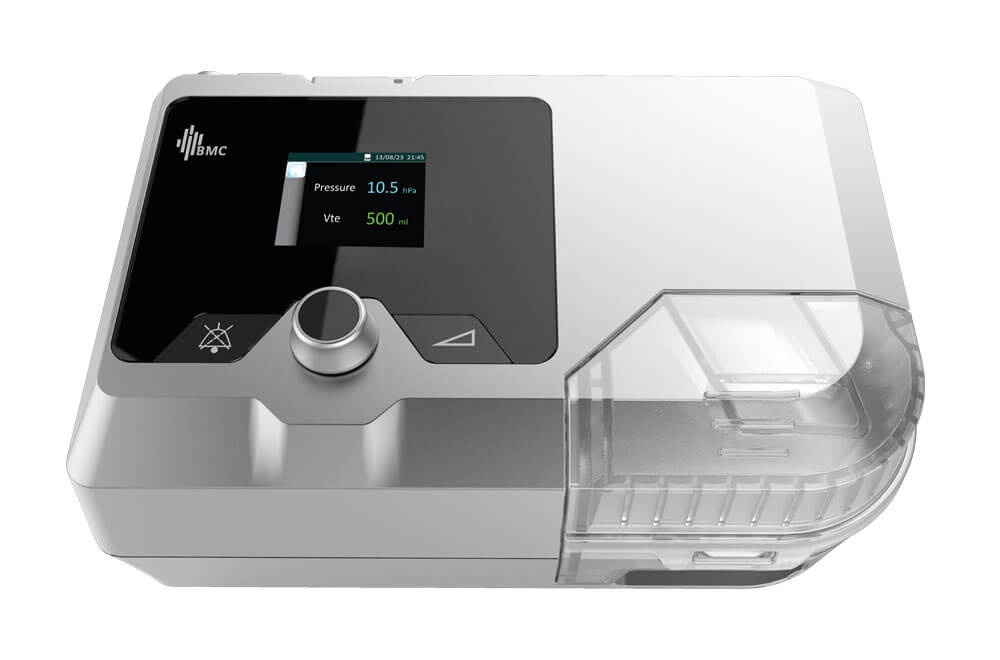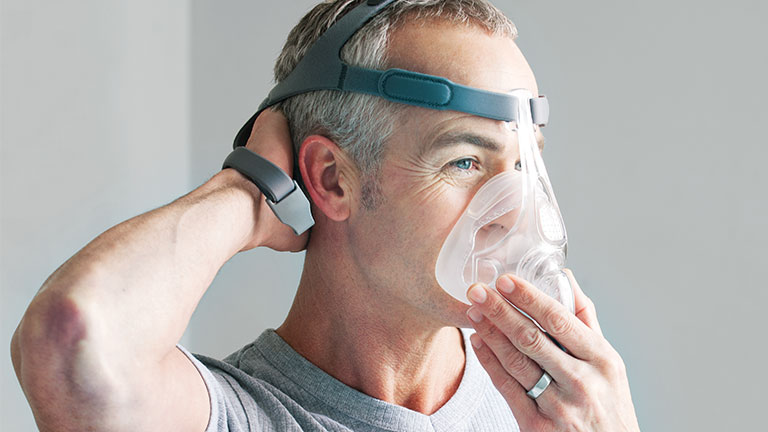Choosing the right CPAP (Continuous Positive Airway Pressure) machine is vital for individuals with sleep apnea or other respiratory problems. Here are a few key elements to understand
while choosing a CPAP machine:
Before buying a CPAP Machine, you should have a prescription from your Doctor. A sleep test will also be essential to determine the best pressure settings for your condition.
Consult with your doctor or a sleep expert to understand the process and outcomes of therapy.
There are three types of CPAP Machines available on the market.

- CPAP (Continous Positive Airway Pressure)- A Manual CPAP is the Elementary version Of a CPAP Machine, In Which a Fixed Pressure is programmed on the device, and the machine will run on that pressure for a complete night
- APAP (Auto CPAP Machine)—The Auto CPAP machine is the most popular version of CPAP Machines; it Automatically Adjusts the pressure throughout the night according to the user’s Needs.
- BiPAP Machine (Bi-Level Positive Airway Pressure)- BiPAP is an advanced version of CPAP used in many respiratory conditions, including sleep apnea. It has two Pressure settings, one for inhaling and one for exhaling. Bipap Machine can be an excellent alternative for Patients who are not comfortable with CPAP therapy.
The patient must consult their physician or sleep expert to determine which CPAP machine to use. We must always refrain from following suggestions from non-trained individuals when selecting the type of CPAP machine required.
Once the type of Device is Confirmed, let’s understand the next important thing in CPAP therapy: the “Type Of Mask Interface.”
There are multiple options for masks on the market. For example
- Nasal Mask: The nasal Mask is the most Used with CPAP Machines. This type of mask sits on your nose without covering your mouth. It is best if the patient has High-pressure settings or Moves around while sleeping.
- Full-face Mask: As the name suggests, a full-face mask covers the nose and mouth. This type of Mask is best for patients who breathe from their mouth and are uncomfortable with a Nasal Mask. It is the most used type of Mask with a BiPAP machine.
- Nasal Pillow Mask: Nasal Pillows are a type Of Nasal Mask. Instead of covering the nose, nasal pillows fit in the nostrils to provide air pressure. This type of Mask is best for Low —and moderate-pressure therapy and is Helpful for Claustrophobia Patients.
- Hybrid Mask – These types Of Masks are also similar to Full Face and Nasal, just the Coverage area and Tube Connections are Different from Classic Masks. Hybrid Full Face Mask will sit below the nose and Cover the Mouth, and the Tube connection can be at the front or on the Top of the Head. Hybrid Nasal masks are Quite Similar to Nasal pillows. The difference can be the connection to the hose pipe. These Masks are comfortable for patients who prefer to sleep upside Down.
Choosing the Right Type of Mask can be tricky. You can get suggestions from your Doctor or Healthcare Provider at the beginning, but choosing the suitable Mask can only be done through trial and Error.

There are diverse CPAP machines, consisting of conventional, APAP (Auto-Adjusting Positive Airway Pressure), and BiPAP (Bi-stage Positive Airway Pressure). Your healthcare provider will advise you on the most appropriate course, primarily based on your circumstances. CPAP machines come with Fixed Pressure (CPAP) or Auto-Adjusting Pressure (APAP). APAP machines mechanically change the air pressure primarily based on your respiratory style at night. Discuss with your healthcare issuer which choice is excellent for you. Some CPAP machines come with integrated humidifiers to add moisture to the air, decreasing ability aspect outcomes, which include dry throat or nasal congestion. A humidifying system may benefit you if you live in a dry climate. Consider the noise degree of the CPAP system, particularly if you’re sensitive to sound. Many more recent models are designed to perform quietly. Read reviews and remember people’s comments to understand the concept of noise tiers. If you tour regularly, you may want a CPAP system that is compact, lightweight, and smooth to transport. Some models are designed mainly for journeys and may have capabilities.
Some machines provide heated tubing to prevent condensation and keep the air warm and cozy. Leak compensation ensures the device continues at the required pressure regardless of minor leaks within the masks. Consider strength options, especially if you plan to use the CPAP device for the tour. Some machines are compatible with diverse power assets, including batteries.
Importance of a proper fitting and setup for effective treatment:
Properly fitting and setting up a CPAP (Continuous Positive Airway Pressure) machine is crucial for effectively treating sleep apnea and related breathing disorders. Here’s why proper fitting and setup are so important:
A properly fitted mask ensures a secure seal, stopping air leaks. This, in turn, helps the CPAP device to supply the prescribed pressure successfully. Inaccurate or poor-fitting masks may lead to pressure loss, decreasing the therapeutic benefits of the treatment. The effectiveness of the CPAP remedy is immediately linked to the accurate delivery of the prescribed air pressure.
Poorly installed devices can also bring about continued sleep disturbances, along with apneas and hypopneas, leading to compromised health outcomes. A nicely fitted mask is more comfortable and will provide proper therapy results. Uncomfortable masks or incorrect setups can result in discomfort, pores, or pressure sores, which may result in users discontinuing or avoiding the usage of the CPAP machine. Humidification settings must be appropriately adjusted to prevent dryness and discomfort within the nasal passages and throat. Individuals may also have distinct facial features, sleep positions, and luxury preferences. A proper selection of devices and masks will have some scope for personalization to accommodate users’ preferences. Customization increases user comfort and the probability of long-term compliance with the CPAP Machine. Checking CPAP reports every Month and following up with healthcare providers is essential to establishing the effectiveness of CPAP therapy. A Proper Reporting system in CPAP machines enables healthcare providers to evaluate the treatment and address Changes to Pressure settings.
